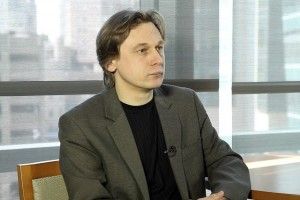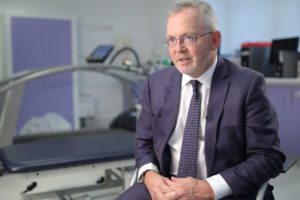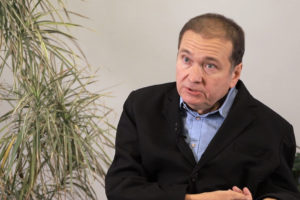Biology of Selenium
Geneticist Vadim Gladyshev on selenoprotein genes, the 21st amino acid, and selenium in human diet
How could insulin-signlalling pathways in our bodies be manipulated to make us live longer? Can centenarian studies reveal the secret of longevity? Does calorie restriction slow down aging? These and other questions are answered by Prof. David Sinclair.
The prospect of living longer has enticed humans probably since we were first conscious. And for that reason there’s a lot of scepticism that we’ll be able to achieve this goal, because so many people have failed until, well, even till now. We have very little way of improving our health or living longer.
So why am I optimistic that one day we will live much much longer and healthier? Well, one main reason is that in other organisms it’s turned out to be rather simple to extend the lifespan of those organisms. And I really don’t think that we are that special when it comes to life forms on the planet. Going back about 25 years the idea that you could do something about aging and slow it down was considered crazy by most people.
Now, if that were the only truth to aging and to biology, then, of course, we would have no chance of slowing down this process. Because, let’s say, I came up with a pill, or someone developed a drug that could keep part of our body healthier for longer, while some other part would still break down. And that’s actually how we practice medicine today — we prescribe a drug for cardiovascular disease, but this does nothing for Alzheimer’s. And this is the real problem that we face.
Now, by that car analogy. Turns out 25 years ago there was a number of discoveries in the late 80’s — early 90’s that said that maybe there is something more to this idea than just a car breaking down. What we now believe is that our bodies are more like — if you want to use that analogy — we’re like cars, but our bodies have inbuilt repair mechanisms that can be brought to life with molecules or genetic manipulations.
So, instead of just thinking we wear out of the time, we actually have inbuilt repairwomen, -men that are working to keep us healthy. So what that means is if we could find a genetic way or pharmacological way to get these repair people up early in the morning or to work harder, we would have a way of keeping our automobile — our bodies — healthier for much longer. The case of that now means that it’s at least feasible that we could have an elixir of youth, something that could let us live a bit longer.
So why am I so optimistic that we could live much longer one day?
No, not enough in my lifetime, I don’t think in most people’s lifetime, but one day. The reason is that a number of labs around the world have made discoveries that single-gene mutations, changing just one gene, in some cases, just one base in a sequence, is enough to extend lifespan dramatically. The best example I can give is work from labs such as the Kenyon Lab, Ruvkun Lab, Johnson labs. They found that mutating of genes in a simple worm, a little nematode worm called C. elegans or Caenorhabditis Elegans, that this little worm that’s about a millimeter long can live twice as long with just one mutation in its genome.
Those genes in that pathway turned out to be related to the insulin-signalling pathways that exist in our bodies as well. And there’s a lot of work that’s going on to trying to understand how that pathway in our bodies could also be manipulated to make us live longer. There’s increasing evidence, actually, from centenarian studies (these are people that in their families tend to live over a hundred years) that the same pathway in a worm is also important for making us live long as well.
But this one genetic change, or this one genetic pathway that I’m talking about isn’t the only one that’s important for lifespan in a worm, and probably isn’t the only one important for lifespan in humans as well. We now know that there’re dozens of important pathways that we’ve discovered in these simple organisms like worms and fruit flies, and even now in monkeys that are able to delay aging quite dramatically.
So how do we think that these genes work? I’m often asked: “Aging is really complicated. How can these genes extend lifespan?” Well, it gets back to that analogy about the car and the repair people. We think that it is what we call “longevity” genes control these “repair people”. So instead of our bodies working, I don’t know, on average 9-5 jobs keeping ourselves healthy, what these genes do when they’re altered is trick the body into thinking that there’s an adversity coming or there’s not enough food, there’s not enough DNA repair. What it does is that it tricks the body into mounting the stress response and repairing the cells better.
So that’s actually a really novel discovery, as I say in the last 20 years or so, that we’ve realized that there’re inbuilt repair mechanisms in not just our bodies, but all of life. And these genes that I’m telling you about, the insulin-signaling and others, are found in all these life forms.
Now another question that’s interesting is why would these genes exist in the first place? And if they exist, and we know they exist, and then if so, why aren’t they switched on all the time if they’re so good for us? Well, what we think is that they evolved to counteract adversity and keep these organisms and ourselves alive for longer, when there’s not enough food around, or there’s some other stress.
You can imagine back in 2 bln years ago, in the primordial soup, when the life forms were swimming around, early life forms, even the simplest cells — they needed a way to adapt, when the conditions became harsh. Let’s say, there wasn’t enough of a certain molecule available. Well, they developed ways to respond to that stress. And what we found is that these genes, that are very ancient, are found in all life forms now. And when organism, such as ourselves, or even little worms, they don’t get enough food, or they don’t get enough vitamins, they don’t get enough amino acids, that tricks the body, tells the body to get into a state of super repair.
So why aren’t they switched on all the time? Well, you don’t want the body to always be in a stress response, that doesn’t make sense. There’re times when there’s plenty of food and nutrients available. Then what you want to do is switch off these pathways and allow the organism to do other things that it needs to do, such as grow, get bigger, multiply, and reproduce, produce offspring, which is, of course, essential for life. And we think that these genes come on and off, depending on whether the environment is harsh or not.
And that leads me to my last point, which is: what are these genes are telling us about is a very interesting diet, known as calorie restriction.
Since actually the early 20th century it’s been known — and you could argue earlier than that — that restricting the amount of food that animals get makes them healthier. And we’ve known for the last for millennia that fasting is healthy and that’s still true today.
The first rigorous experiments were done in 1935 by McCain colleagues in the US, and they found that restricting calories of rats by about 30-40% greatly increased their health and made them live longer. And this is really a quite dramatic finding, and it’s been studied ever since by people who want to understand how to slow down aging. There’re people today who’re calorie restricting themselves in the hope that it will make them live longer, but we don’t yet know if that’s going to happen.
But calorie restriction is amazing because it’s the most reproducible and robust way to extend lifespan in very different organisms — from these little worms through to monkeys, in fact. So what we think is going on under here, under the hood of the car, is that the diet is tricking the organism into thinking that the conditions are so harsh that it has to constantly repair itself. These genes that I’ve talked about, the insulin-signaling and other, so-called the longevity genes, they respond to the lack of food and they come on, and these defenses come on.
Perhaps, one day we will find molecules that we can take as a pill, for example. That instead of having to go hungry, to fast all the time, we could pop a pill that would tell the body, or at least trick the body into thinking that it’s not getting enough nutrients or enough food and will turn on this inbuilt repair system, this innate defense that exists in our bodies, and those would keep us healthier for longer. And perhaps, when we’re in our nineties and hundreds we could still be healthy and play tennis with our great-grandkids and teach them all the wisdom that we’ve accumulated over the decades.
Maybe one day we could live twice as long, like that little worm has shown more than 20 years ago. And if we live in a world like that, where people live healthy and longer lives, I think it would be a much more interesting and productive world to live in. And actually, I think that those people will look back at today with some sort of pity that we only lived these short, relatively unproductive lives.

Geneticist Vadim Gladyshev on selenoprotein genes, the 21st amino acid, and selenium in human diet

Epidemiologist Nick Wareham on metformin, preventive therapy of diabetes, and metabolism in obese people

Neuroscientist Onur Güntürkün on mammalian brain, ravens’ ability to plan into future and why birds are so int...